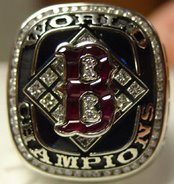I guess Coco wasn't quite dead. Sure, it took until late June but Coco Crisp is in fact beginning to kick. Well, that's not completely true. To be fair, Crisp began hitting when June began. He went 4-10 against the Yankees June 1st, 2nd and 3rd and has hit .333 in the month of June. Throughout his career, Crisp has been somewhat of a second half player. Similar to Johnny Damon, Crisp's career average after the All-Star break is actually .015 points higher than the one he has in the first half of the season.
Speaking of our old friend Johnny "Who?", Epstein looks pretty smart right now for not signing him. In year two of his contract with the Yankees, Johnny Damon's already breaking down. Over the next 3 years, the Yankees are on the hook for $39 million for a player who can barely field his position a few days a week. Coco Crisp isn't any Ichiro but he's one of the best fielding center fielders in the league and is both out-hitting and out-slugging the guy he replaced. Did I mention Crisp costs something like $10 million less?
When the Red Sox signed Matsuzaka, I said I'd be happy if ecstatic if he posted anything lower than a 4.00 ERA in his first season in the AL East. As we approach the half way point of the season, he's almost there. After tonight's win, Matsuzaka is now 9-5 with a 4.01 ERA and a 1.29 WHIP. I think it's rather clear however, that he has the ability to be much more dominant.
Through his first 98.2 major league innings, Matsuzaka has allowed only 93 hits while striking out 102. His biggest issue to this point has been his control. His BB/9 innings pitched of 3.19 isn't bad, but it's nowhere near the control he exhibited in Japan.
Whether it's adjusting to a 5-man-rotation, major league umpires or a new workout regiment, Daisuke's BB/9 innings pitched is up significantly from the 1.64 he posted last year in Japan. Such lapses in control are rather normal for pitchers transitioning to the major leagues and they almost always go down. Other than the walks, he's pitched relatively similar to the way he did last year. His K/9 IP ratio has gone down by only 0.36.



No comments:
Post a Comment